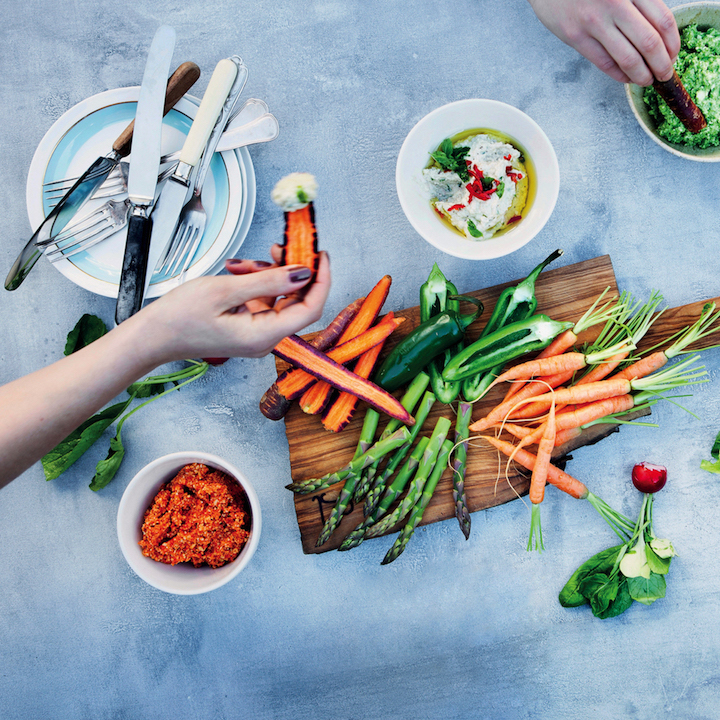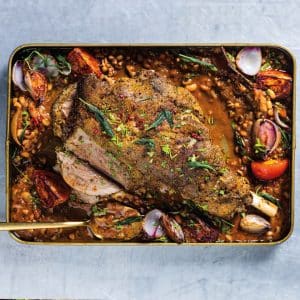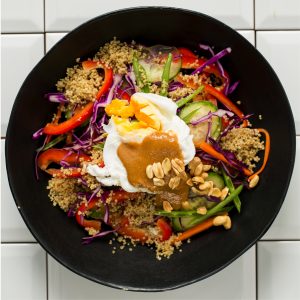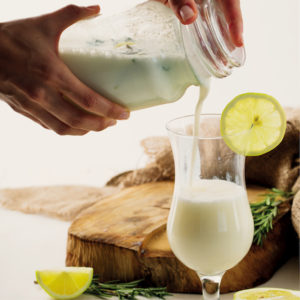With an overload of nutritional misconceptions and myths, it’s difficult to determine which foods are healthy and which are not. Here, we separate the good eggs from the bad. We’re here to bust those health food myths.
By Tracy Branfield
1. Myth: Eating fat makes you fat
Verdict: False – It depends on the type of fat and your diet. ‘There’s a big difference between the fat found in deep-fried chips and fat found in an avocado,’ explains dietitian Kelly Lynch. ‘I would recommend increasing the amount of plant fat in your diet, as these monounsaturated and polyunsaturated fats are actually very good for you.’ Combining large amounts of fat with carbs is what you need to watch out for. One study from the Tulane University School of Public Health and Tropical Medicine found that a diet high in good fats and low in carbs is more effective than a low-fat diet for weight loss.
The takeaway: Stock up on avocados, nuts, seeds, cold-pressed oils, such as olive and coconut oil, and organic nut butters. Avoid trans fats found in fried foods, salty snacks, ready-made meals and pastries.
2. Myth: Organic food contains more nutrients and is therefore healthier
Verdict: Undecided – ‘The answer isn’t clear yet, as more research needs to be done,’ explains Nicola Drabble, a dietitian at Joburg’s Netcare Waterfall City Hospital. ‘A recent study examined the past 50 years’ worth of scientific articles about the nutrient content of organic and non-organic food. The researchers concluded that there wasn’t a significant difference in nutrient content between organically and conventionally produced foods.’
The takeaway: If you are willing to pay more for products that are guaranteed to be closer to nature, then go for it.
3 Myth: Red wine is good for your heart
Verdict: True – But in small quantities. Good news for the ladies who like to unwind with a glass of vino: Drinking a moderate amount of red wine (one glass a day) has been linked to protection against artery damage and heart disease. However, Kelly stresses the importance of limiting your consumption of all alcoholic beverages. ‘It’s the antioxidants found in the wine that have been shown to keep our hearts healthy, but consuming alcohol in large amounts is very toxic for the body.’
The takeaway: Blueberries, strawberries and red grapes provide the same potent antioxidants as wine, so skip your tipple and opt for one of these scrumptious fruits instead.
4. Myth: A kilojoule is a kilojoule, regardless of the type of food it comes from
Verdict: False – Not all kilojoules are created equal. Energy is measured in kilojoules (kJ) or calories, and whether you are eating a 700 kJ bag of salt- and-vinegar crisps or a 700 kJ tub of yoghurt, you are still consuming the same amount of kilojoules. However, it gets more complicated depending on the type of food you eat. ‘Crisps are high in bad fats and salt, which can increase your cholesterol and risk of high blood pressure,’ explains Nicola.
The takeaway: Quality beats quantity, so opt for dairy products, such as yoghurt, that are higher in protein, calcium and nutrients to aid your body’s health.
5. Myth: Too many eggs are bad for you
Verdict: False – New evidence shows that eggs are very nutritious. In years gone by, people were told to drastically limit their intake of eggs as it was believed that the high cholesterol found in the yolks would result in a higher risk of heart disease. However, a study done at the University of Connecticut revealed the opposite to be true – eating eggs had no effect on increasing the blood cholesterol levels or the risk of coronary heart disease in non-diabetic participants, meaning these globes of goodness can be regularly included in your diet for multiple health benefits. ‘Eggs contain an amino acid called choline, which is really good for general cell health,’ says Kelly. Now you can have eggs for breakfast knowing that you are eating a vitamin- and mineral-rich food that definitely makes your body healthier.’
The takeaway: Boiling, poaching or scrambling your eggs is a lot healthier for than frying them in thick oil or butter.
6. Myth: Being vegan or vegetarian leads to deficiencies in the body
Verdict: False – It depends on what you are eating. ‘There’s a widely accepted yet naive belief that vegans and vegetarians run the risk of lacking nutrients and minerals in their diets as a direct result of cutting out animal meat and other foods from their diets. However, as long as you are following a healthy, balanced vegetarian or vegan diet, you shouldn’t have any deficiencies,’ explains Nicola.
The takeaway: Include lots of plant-based proteins, such as nuts and pulses, as well as iron-rich foods such as beans and dark, leafy greens.
7. Myth: Eating five or six small meals throughout the day helps keep your metabolism revved up
Verdict: True – But this doesn’t mean having three meals a day is wrong. Have you ever skipped a meal, only to be ravenously hungry later on and ended up eating everything in sight? You can avoid falling into the trap of eating more than you should by scheduling regular, lighter meals throughout the day. ‘I recommend smaller meals, as this keeps your blood sugar, appetite and metabolism balanced,’ says Kelly. ‘Make sure you eat breakfast within 60–90 minutes of waking up, and have a small meal or snack every three or four hours after that.’
The takeaway: While researchers at the School of Human Kinetics at the University of Ottawa found that eating more frequently led to the same amount of weight loss as eating three main meals each day, the frequency of meals depends entirely on personal preference.




